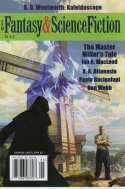
| Editor: | Gordon van Gelder |
| Issue: | Volume 112, No. 5 |
| ISSN: | 1095-8258 |
| Pages: | 162 |
James Sallis has a good book column this month, covering Powers and Miéville, and Kathi Maoi's film column is one of her better ones. The non-fiction overview of nanotech is mostly a random collection of interesting technology, but I like the emphasis on current practical applications rather than the SF trope of tiny robots.
The highlight of the fiction is an strong novella from Ian R. MacLeod. The fiction is generally strong, not always successful but trying to do something different and avoiding standard patterns. There's a small theme this issue around altered ways of looking at the world and conflicts of world views.
"The Master Miller's Tale" by Ian R. MacLeod: This is a beautifully atmospheric story in the same world as The Light Ages but readable without knowing the novel. It follows the life of the heir of a family of millers, learning the spells that keep the mill turning and catching the wind and watching each year when his father purchases winds from the travelling wind salesman. He becomes a man and inherits the mill, settling into a comfortable and delightful life despite some disconcerting run-ins with the daughter of a local rich family. But then industry comes, magic is drawn out of the ground through larger-scale, darker magic, and steam power starts to destroy his business. This story has the resonance of the legend of John Henry, but mixed in is the ugly futility of Ludditism and the tendency of resistance towards embracing what it's fighting. The ending is dark but with an odd twist of hope, or at least deeper powers still persisting under the changing of the world. Full of compelling description and beautifully written. (8)
"The Tamarisk Hunter" by Paolo Bacigalupi: Bacigalupi takes another break from his bleak calorie-obsessed future and instead shows a bleak water-obsessed culture, where contracts with California have drained states farther east of most of their water and the National Guard patrols the rivers to keep anyone from stealing water from those downstream. There is a bit of plot following a man who poisons water-consuming plants for bounty and surreptitiously replants them to stay in business, but the plot is mostly a mechanism for world exploration. The setting is dark and the ending darker. File this one under believably dire futures. (6)
"Kaleidoscope" by K.D. Wentworth: It starts with a dog that Ally vividly remembers rescuing, and equally vividly remembers seeing die under the wheels of a car. From there, her world splits more and more, unsure from day to day, memories competing and seemingly equally valid. Her friends keep changing, but she remembers their new past each time they do. She tries dating a man who turns out to be an incredible bore, and then remembers a wonderful date with a very different man. She looks for that man, getting close and then having her memories prove false again. Wentworth builds a tale of uncertainty and regret, taking the lost opportunities and might-have-beens of any life and turning them into vivid alternate memories, sending Ally cascading helplessly through lives. In the end, this is a love story, coming from an odd angle to a message about positive thinking. It's a bit sappy, but it helped that I found the main character thoroughly likeable. (7)
"The Great White Bed" by Don Webb: This was my least favorite story of the issue, but mostly that's because it's not my genre. This is horror about caring for a relative who's becoming senile until a strange book makes him oddly lucid, and about a bed that leads to strange dreams that become all too real. I never figured out what was going on in this story, but it's evocative and deeply disturbing at the end. I expect people who like this genre will enjoy this one. (4)
"Telefunken Remix" by A.A. Attanasio: Talk about different perspectives. Attanasio starts with a lavishly purple description of paradise, clones, and constructed beings living in a heavily artificial world of some sort of great overmind. Slowly, we discover that this is the far, far future and that the heroes have a resonance and connection with long-lost Earth, tragically doomed to extinction before the enlightened galaxy discovered their receptor in the Milky Way was broken and they missed the birth of intelligent life. A clone wants to swap places with his Earth self for the sort of altruistic reasons one finds in the young and idealistic, but this quickly goes pear-shaped and the reader is treated to beautiful conflicting descriptions of future paradise and current grunge. One has to enjoy elaborate metaphors mixed with old-fashioned attempts to impose superior morality on the mess of Earth politics, but Attanasio achieves a beauty of description and a sense of otherness in his characters that kept me intrigued. (7)
Reviewed: 2007-07-16